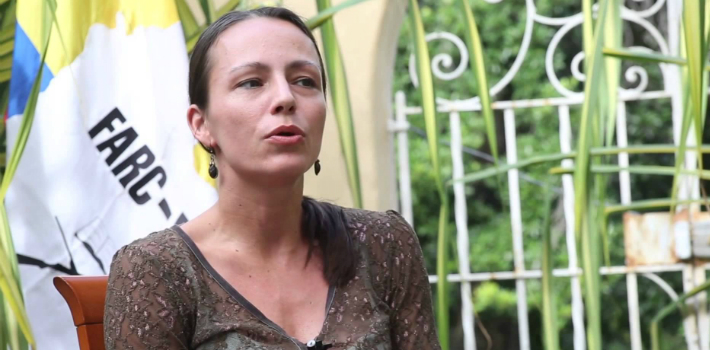EspañolMuch of the analysis regarding the grave situation in Venezuela has focused on the lone figure of Nicolás Maduro — his inability to govern and lack of education, for example. However, the current situation in Venezuela is not the result of one personality, but rather the ideas that members of this society believe.
This was apparent in an interview that appeared a few days ago with a representative of the Revolutionary Armed Forces of Colombia (FARC), currently in negotiations with the Colombian government in Havana. The representative goes by the name of “Alexandra,” and unlike the Venezuelan president, she is from Holland. On the surface, she appears to be a harmless person — concerned about social issues and, according to her statements, highly educated.
However, just as with Venezuela and its defenders of Socialism for the 21st Century, she justifies the existence of the guerrilla army on the basis of inequality that exists in Colombia. She perhaps ignores that at the time of the creation of the FARC (1964) there may have been direct influence from the Cuban Revolution of 1959, which brought in a new ruling class and immense poverty for the general population.
Even worse is that she boasts a terrifying simplicity in her way of thinking. She explains that her decision to join the armed group came when she realized the impossibility of working within the law to address the problems of inequality. She claims that anyone who thinks differently in Colombia is assassinated, imprisoned, or persecuted. Besides this simply not being true, her statements discount the work of thousands of people who, without the use of arms, also care about human rights and defend “different ideas” similar to her own within a democratic framework.
“Alexandra” tries to project an image of the guerrilla as a “savior.” However, she does not recognize the atrocities that she herself is committing, and merely dismisses them as simple mistakes.
Moreover, she refers to this illegal group as if it were concerned about the education of its combatants — as though “education” were inherently positive, regardless of what type of information is being taught or what use it provides. One can, of course, learn to read or write through other means, without the need to create a group of assassins who bomb and rob the lands of the farmers they claim to protect and educate.

The effort to clean up the image of the guerrillas is the most deplorable element of the interview. This must be done, according to her — and the same goes for the Venezuelan regime — because the media is biased. They feel they are victims being attacked on all fronts.
In reality, they are the ones who only tolerate others saying what they want to hear. For them, the only objectivity that can exist is one that fawns and conceals their violent and impoverishing methods. They do not understand that in liberal societies like the United States, ideas of all sorts are not just tolerated, the open criticism enriches the nation.
Her branding effort and attack on the press reflects the paranoia on which the FARC depends. The paranoia is also visible in the way she describes the role of the international community in the Colombian conflict. She claims the response from the Colombian military is not a result of the threat posed by the guerrillas, but instead driven by the intervention of the United States and other multinationals.
It must matter very little to her that there is an inherent contradiction in criticizing the intervention of the United States. She takes up arms herself, not in her native Holland, but in Colombia.
On the other hand, she reflects the core of the statist perspective: the state is a superior being, capable of thought and feeling, whose raison d’être is an undefined illusion of “sovereignty.” As such, this young Dutch woman claims the Colombian state has “no feelings of sovereignty,” or “love for its people.” It doesn’t even want to “share its well-being with the people of Colombia.”
This young guerrillera ignores the fact that empathy is a feeling shared among individuals, and “well-being” refers to something that pertains to people, not an organization like the state.
One could argue that “Alexandra” embodies the condescending attitude of superiority that Europeans have when analyzing the situation in countries like Colombia and the people who appear to them as simple folk. That’s possible. However, the problem has more to do with the ideas that this young woman believes in, and the conclusions they lead to.
For this reason, Colombians must defend the need to reach a peace agreement, but also ensure ideas such as these never come to power. As demonstrated in our neighboring Venezuela, they are not only ineffective, but they perpetuate poverty, inequality, and more conflict.
Translated by Guillermo Jimenez.
 Versión Español
Versión Español












